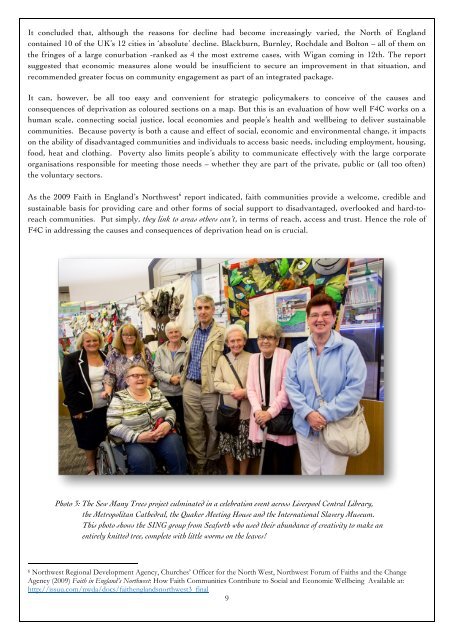Programme Evaluation 2014-15
You also want an ePaper? Increase the reach of your titles
YUMPU automatically turns print PDFs into web optimized ePapers that Google loves.
It concluded that, although the reasons for decline had become increasingly varied, the North of England<br />
contained 10 of the UK’s 12 cities in ‘absolute’ decline. Blackburn, Burnley, Rochdale and Bolton – all of them on<br />
the fringes of a large conurbation -ranked as 4 the most extreme cases, with Wigan coming in 12th. The report<br />
suggested that economic measures alone would be insufficient to secure an improvement in that situation, and<br />
recommended greater focus on community engagement as part of an integrated package.<br />
It can, however, be all too easy and convenient for strategic policymakers to conceive of the causes and<br />
consequences of deprivation as coloured sections on a map. But this is an evaluation of how well F4C works on a<br />
human scale, connecting social justice, local economies and people’s health and wellbeing to deliver sustainable<br />
communities. Because poverty is both a cause and effect of social, economic and environmental change, it impacts<br />
on the ability of disadvantaged communities and individuals to access basic needs, including employment, housing,<br />
food, heat and clothing. Poverty also limits people’s ability to communicate effectively with the large corporate<br />
organisations responsible for meeting those needs – whether they are part of the private, public or (all too often)<br />
the voluntary sectors.<br />
As the 2009 Faith in England’s Northwest 6 report indicated, faith communities provide a welcome, credible and<br />
sustainable basis for providing care and other forms of social support to disadvantaged, overlooked and hard-toreach<br />
communities. Put simply, they link to areas others can’t, in terms of reach, access and trust. Hence the role of<br />
F4C in addressing the causes and consequences of deprivation head on is crucial.<br />
Photo 3: The Sew Many Trees project culminated in a celebration event across Liverpool Central Library,<br />
the Metropolitan Cathedral, the Quaker Meeting House and the International Slavery Museum.<br />
This photo shows the SING group from Seaforth who used their abundance of creativity to make an<br />
entirely knitted tree, complete with little worms on the leaves!<br />
6 Northwest Regional Development Agency, Churches’ Officer for the North West, Northwest Forum of Faiths and the Change<br />
Agency (2009) Faith in England’s Northwest: How Faith Communities Contribute to Social and Economic Wellbeing Available at:<br />
http://issuu.com/nwda/docs/faithenglandsnorthwest3_final<br />
9


